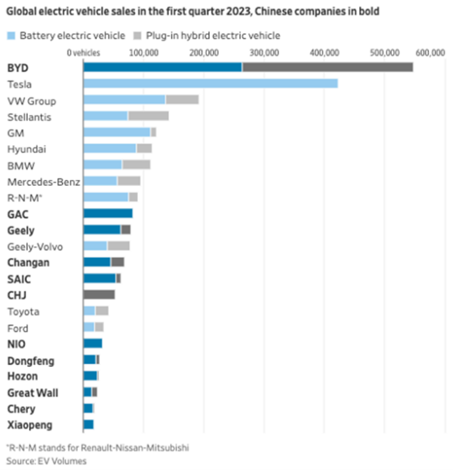China has become the 20% market – 20% of world GDP and 20% of multinational total revenue. This explains the steady stream of US CEOs to China. And China, while playing catch-up in semiconductors, continues to power ahead in the electric vehicle (EV) market, led by BYD Co. (BYDDY), educates Carl Delfeld, editor of Cabot Explorer.
For example, Tesla (TSLA) CEO Elon Musk visited Beijing recently and was quoted as saying that the US and China are “intertwined like conjoined twins.” JPMorgan Chase (JPM) CEO Jamie Dimon was in Shanghai after doubling the bank’s China head count over the past four years.
Apple’s (AAPL) Tim Cook spoke this March to an audience in Beijing and said that being in China “means the world to me” given the “symbiotic relationship” his company has with the country. It represents about 20% of Apple’s revenue and product content and 80% of production.
China is the largest or second-largest market for many other US multinationals including GM, Starbucks, McDonald’s, and Nike. Meanwhile, according to the Financial Times, less than half of US low-cost imports from Asia will come from China by the end of this year, representing a 10-year low.
While America still leads in innovation, like Japan before it, China has a system, scale, and a knack for turning ideas into products on the factory floor.
More than a decade ago, Pony Ma, the founder of Tencent, explained to Fast Company a point that used to be made about the Japanese:
“In America, when you bring an idea to market you usually have several months before competition pops up, allowing you to capture significant market share...In China, you can have hundreds of competitors within the first hours of going live. Ideas are not important in China—execution is.”

As for BYDDY, it recently vaulted from 60 to 64. BYD offers an EV lineup ranging from $11,000 to $160,000 in price and has started supplying batteries to Tesla. In 2022, BYD’s total vehicle sales jumped ahead of Tesla as sales including hybrids tripled.
Recommended Action: Buy BYDDY.










